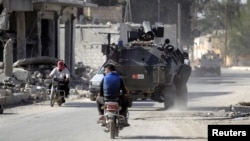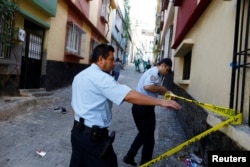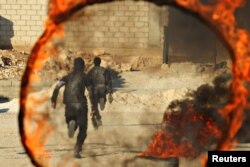Turkish authorities imposed a social media blackout following Friday's release of the Islamic State (IS) video purportedly showing two Turkish soldiers being burned alive.
For several hours, Facebook, Twitter and YouTube all were blocked. After the blanket ban was lifted, internet service reportedly was slow across the country and all sites showing the video were blocked.
Turkish mainstream media did not report on the video. While there has been no official Turkish reaction to the video, authorities are quoted in local media saying the restrictions were imposed for the sake of public order.
The video follows Thursday's killing of 16 Turkish soldiers by an IS suicide bomber in the Syrian town of al-Bab. That was the largest number of fatalities in one incident since August, when Turkey launched its cross-border operation into Syria against IS and Syrian Kurdish rebel groups.
Turkish President Recep Tayyip Erdogan, speaking Thursday to hundreds of supporters ın hıs presidential palace, strongly defended the operation.
“Our struggle is not an ordinary struggle. We have 16 martyrs; around 200 Daesh fighters have been killed,” he said, using an Arabic acronym for IS.
“We could not stay silent against those that threaten our country, and we are doing what is necessary,” he added.
The operation was launched after IS carried out a suicide bombing at a wedding in the Turkish border city of Gaziantep, killing more than 50 people.
Building pressure
With the latest deaths of Turkish soldiers, however, the government is facing growing political pressure.
“This is the consequence of failed compromises and wrong foreign policies. Turkish troops should not be dragged into the Middle East’s quagmire,” warned Kemal Kilicdaroglu, leader of the main opposition Republican People’s Party, on Friday.
Such criticism could strike a chord within the country, according to some observers, who say public concerns over the operation already have imposed parameters on its scale.
"It won't be an operation of 30,000 to 40,000 [soldiers], like what we saw in [the] past with hot pursuit operations into Iraq against the PKK," predicted political columnist Semih Idiz of Al Monitor website. “I don’t think the public is ready for that. Increasing losses is what the public is very nervous about."
One factor behind any public unease is that the operation in Syria comes as Turkish forces are fighting the PKK Kurdish rebel group in Turkey’s predominantly Kurdish southeast. Experts warn that Turkey’s armed forces already are paying an increasingly heavy price for operations with no exit strategies.
"Southeast [Turkey's campaign] is indefinite; Syria looks indefinite and there will be two outcomes,” said retired Brigadier General Haldun Solmazturk, a Turkish veteran of counterinsurgency operations and now head of the Ankara-based 21st Century Turkey Institute.
The first outcome, he added, would be the slowing of the operation tempo. "And the other is the increase in the casualty rates. And in Syria both are happening."
Further threats
The price Turkey is paying could well increase. In Friday’s video, IS warned that its forces will strike back inside Turkey if Ankara does not end its operations in Syria. Experts say that threat should be taken seriously.
"The main risk to me is [IS] responds, answers will come inside Turkey, like they did in Antep, in Suruc, in Ankara,” observed regional analysts and former senior Turkish diplomat Aydin Selcen, who worked across the region and was using another acronym for Islamic State.
"I am afraid they may, they will attack inside Turkey," he said.
The threat Turkey faces is predicted to rise with the Islamist militants facing military setbacks and the prospect of defeat in Syria, warned analyst Selcen. "If those Jihadist groups based in Idlib are forced by Syrian regime forces toward Turkey, and [IS] elements are pushed toward Turkey, that will be ultimately the main danger to Turkey.”
On Friday, Turkish security forces in Istanbul arrested more than 30 people accused of links to IS. Ten others reportedly are being sought.
The Jihadist group this year repeatedly targeted Istanbul in suicide bombings of foreign tourists and launched an attack on the city’s main airport in June. With Ankara promising to step up its operations in Syria against IS, analysts say Turkey's security forces are bracing themselves for further attacks by Islamist militants.
The U.S. embassy in Turkey issued a warning Friday, urging U.S. citizens to be "mindful" of the security threat "when deciding to attend public gatherings for Holiday and New Year's Eve celebrations."






